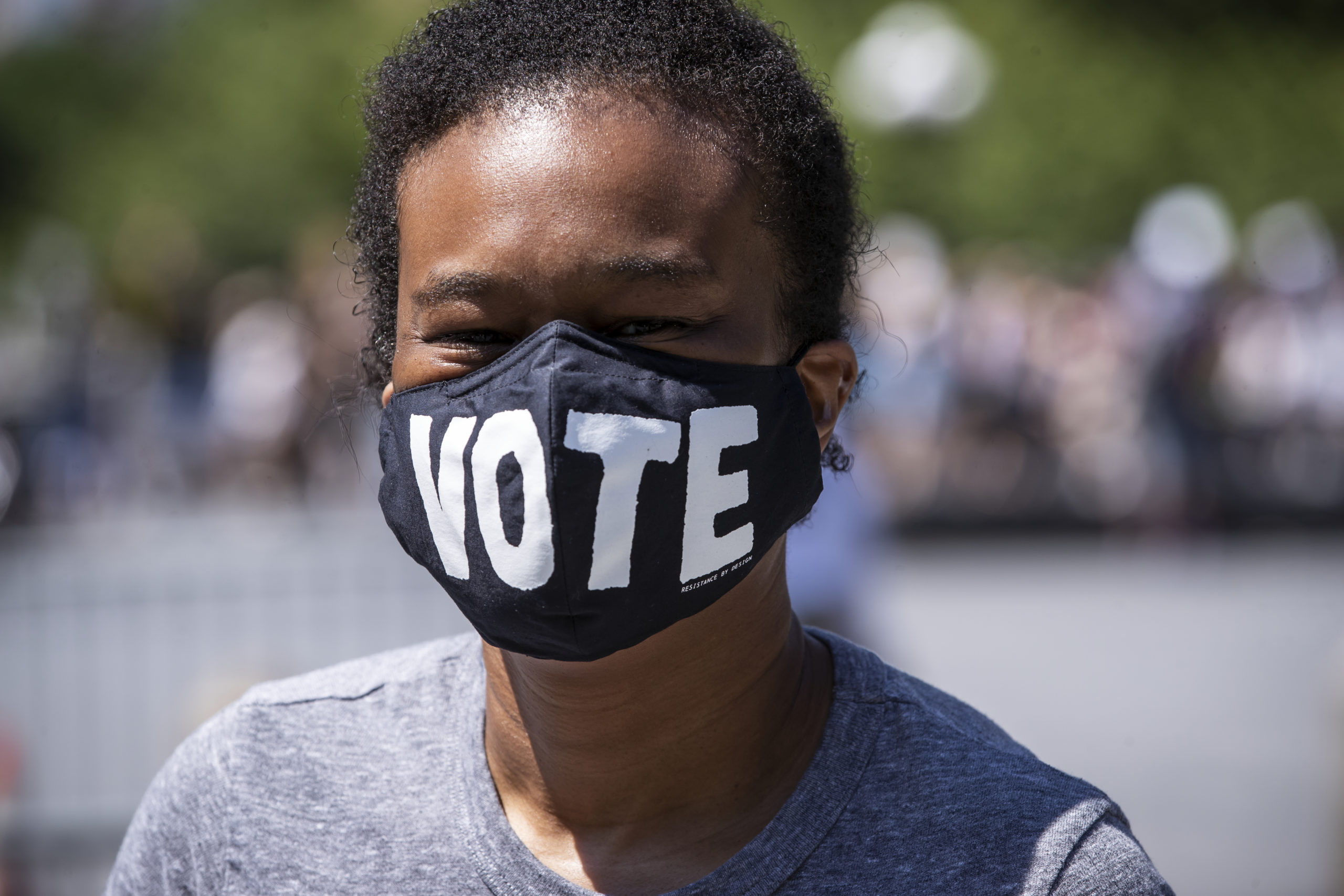
After Georgia voters turned out in record numbers for the 2020 presidential election and U.S. Senate elections in early 2021, state legislators passed S.B. 202, a sweeping racially discriminatory and other unconstitutional and illegal omnibus law that by its individual and collective provisions disenfranchises voters, particularly voters of color.
On March 30 2021, LDF and civil rights groups filed a federal lawsuit challenging Georgia’s sweeping new voter suppression law, S.B. 202, that will restrict access to voting and disproportionately burden voters of color, new citizens and religious communities. The lawsuit describes how S.B. 202 violates voter protections under the 14th and 15th Amendments to the U.S. Constitution, as well as Section 2 of the Voting Rights Act, the Americans with Disabilities Act, the Rehabilitation Act, and the Civil Rights Act of 1964. It also outlines how the “line relief” ban violates the First Amendment right to freedom of expression.
LDF and its co-counsel filed an amended complaint on May 24 2021 which you can read here. Three Georgia-based disability rights groups- The Arc Georgia, Georgia ADAPT, and the Georgia Advocacy Office,- as well as the Southern Christian Leadership Conference joined as plaintiffs.
On August 18, 2023, a federal court in the Northern District of Georgia issued rulings in response to emergency motions filed by civil rights groups to lift restrictions put in place by Georgia’s anti-voter law, S.B. 202, for the 2024 elections.
The rulings blocked portions of the bill that ban Georgians from providing food and water to voters waiting in lines more than 150 feet from the polls, and that require voters to unnecessarily include their birthdate on absentee ballot envelopes. The court sided with the plaintiffs in ruling that Georgia’s ban on providing food and water to voters waiting in lines further than 150 feet from the polls likely violated their First Amendment right to free expression. Groups and individuals may now provide relief to voters in the 2024 elections who are waiting in long lines that stretch more than 150 feet from the polling location entrance.
The court also struck down, for purposes of the 2024 elections, the requirement that Georgia voters provide their birthdate on their absentee ballot envelope or have their ballot rejected. Because Georgia determines whether someone is qualified to vote not only upon registration but also through the absentee ballot application process, the court ruled that rejecting a voter’s absentee ballot because they failed to provide a birthdate or provided the wrong date on their ballot envelope violates a provision of the Civil Rights Act of 1964 forbidding denying someone the right to vote based on an immaterial error or omission.
The ruling comes after voting and civil rights groups filed motions in May 2023 for preliminary injunctive relief to lift barriers to voting for the 2024 elections in Georgia that would disproportionately impact Black voters, other voters of color, and voters with disabilities.

Since the passage of S.B. 202, a campaign of misinformation about the bill has been circulating suggesting that the bill doesn’t harm voting rights, and in fact expands voting access.
Makes it a crime to give or to “offer to give” food and water to individuals waiting in line to vote. Overall, Black voters are likely to wait 45% longer in line to vote than white voters. Black Georgians, on average, wait nearly 1 hour to vote; white voters only 6 minutes. In the 2020 primary election, Black voters in Fulton County waited over 5 hours to vote. During the early voting period in the 2020 General Election, some Fulton County voters waited more than 10 hours to cast a ballot.
Places unnecessary, burdensome, and new restrictions on absentee voting. This would require voters to provide a photocopy of and mail sensitive identification information to request a ballot. Similar sensitive information, including a voter’s social security number, may be required to return an absentee ballot – including on the outside of the ballot envelope.
While the law allows for a “free” state-issued ID for those who do not have one, driver’s license offices in Georgia’s Black Belt include 21 contiguous and predominantly Black rural counties where those offices are open 2 days per week or fewer. Additionally, studies show that the actual cost for “free IDs” typically range from $75 - $175 after factoring in documentation, travel and waiting time.
Allows for the use of secure drop boxes, but caps the total number, limits where they can be located, requires them to be placed inside a polling location (outside of an emergency), limits the hours, limits their use and availability to only during the early voting period, and imposes new in-person security requirements. These limitations on secure drop box use and availability will disproportionately impact Black voters and other historically disenfranchised groups.
Codifies that Georgia electors can submit unlimited challenges to the right of any voter to remain registered or to cast a vote. This is an invitation to unfettered voter intimidation. After the November 2020 election, there were several mass baseless and untimely voter challenges – including one challenging the eligibility of 360,000 Georgia voters. S.B. 202 allows even greater opportunity for challenges despite no significant findings from challenges in November.
Invalidates provisional votes cast in the correct county, but the wrong precinct. Prior law allowed these votes to be counted if cast in the proper county. This will disproportionately affect voters of color, which have seen an increased number of polling location closures and changes, thereby increasing the need to vote provisionally.
Unilaterally empowers the State Board of Election to take over the process of disqualifying ballots across the state, removing that power from county boards of election. This provision also removes the Secretary of State from its role as both the chair and a voting member of the state board. The legislature, which already appoints two of the five board members, will now appoint the new chair, giving it majority control of the state board.
